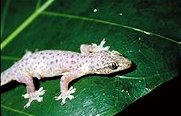| Gehyra | |
|---|---|
 | |
| Gehyra vorax | |
| Scientific classification | |
| Kingdom: | Animalia |
| Phylum: | Chordata |
| Class: | Reptilia |
| Order: | Squamata |
| Suborder: | Gekkota |
| Family: | Gekkonidae |
| Subfamily: | Gekkoninae |
| Genus: | Gehyra Gray, 1834 |
| Species | |
72 recognized species, see text. | |


Gehyra is a genus of geckos, lizards in the family Gekkonidae . Species within the genus are known as web-toed geckos or dtellas, and most bear close resemblance to geckos from the genus Hemidactylus .